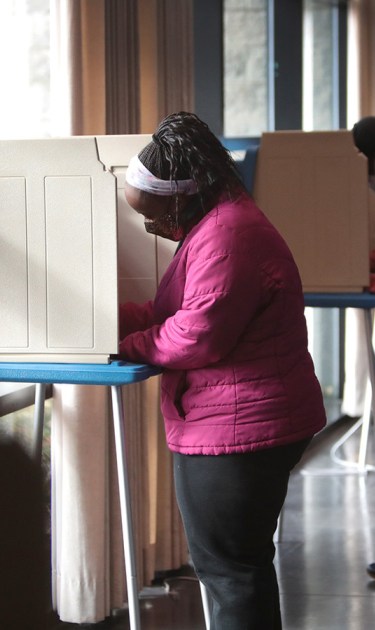Texas, Florida, and Pennsylvania are toss-ups. Vegas odds have the president as a +165 underdog. Will the remaining mail-in-ballots all arrive in time to be counted? The questions are infinite. With Tuesday (November 3) upon us, if your pandemic lockdown anxiety and regular ol’ anxiety are coalescing with election anxiety, you’re not alone.
It is undeniable that the result of this election will have a direct and monumental effect on our lives. Still, in spite of the winner’s last name or party, we must carry on–and until this week is through we’ll have to manage. In the meantime, three different experts–a psychotherapist, an astrologer, and a self-care advocate–weigh in on how to get through the mounting election anxiety.
Kirah Tabourn, Astrologist, @TheStrology
People should know to pace themselves. The clarity is not there on election day. We’re not going to know on election day. Even non-astrologers are saying that.
Astrologers have been eyeing the 2020 election for a while. Astrologically, it’s just jam packed with intense planetary alignments. Mars only retrogrades every 26 months, the fact it aligned on top Mercury retrograde and other alignments adds to the craziness that is 2020.
Mercury is standing directly on election day, meaning it will be its most chaotic day. We have precedent for this. The election of 2000 did the same. It’s stationed in the same sign, in Libra in 2000 and it’s in Libra this year…if you remember that election.
Mercury rules things like writing, communication, transport, [and] anything that has to do with sending information from point A to B. We’ve clearly had this huge issue with the mail service. It doesn’t necessarily mean things will go one way or another.
You don’t have to scroll Twitter all day. You don’t have to check CNN. You don’t have to be in the know if you’re someone that’s got a more sensitive nervous system. Take care of your nervous system. If that means not tuning in, that’s smart.
Hannah Propp, LMSW, Psychotherapist, Greenpoint Psychotherapy
A lot of people catastrophize. I feel like a broken record sometimes, but I’m often [telling] my clients to be gentle with themselves right now. A lot of people are experiencing a very specific type of anxiety overload, which can often lead to fatigue and depression. For some who have trauma related to oppression, it can be particularly heavy and stressful. This election can definitely bring up those experiences to the surface and even trigger a trauma response, a fight, flight, or freeze response. There can be a lot of self-criticism and shame, around feeling they haven’t done enough, or a feeling you can’t get off the couch, which is fairly common.
A lot of people will be hard on themselves for overindulging. Your body is incredible and has gotten you through so much in 2020 and so much in even just the past six months. Try to tap into gentleness if you’re not ready for gratefulness. If you need distraction, that’s OK–allow yourself that. If you need comfort, allow it. Doing things for yourself are not only fun or enjoyable or bring some type of joy, but on a smaller scale, work to quiet that self-criticism.
If you can’t have a three-hour convo with your friend or family because you’re feeling drained, but can send your mom a glitter heart emoji, that’s great. Think about where your capacity is and holding your boundary and doing the work in service of yourself.
Jezz Chung, Transformation Facilitator and Self-Care Advocate, @JezzChung
The voices of depression, anxiety, and trauma tell us we’re too complicated to be understood and too broken to feel whole and too doomed to find peace. We reduce the volume of those lies when we feel loved. Studies show that giving and receiving care helps elevate our mood and combat feelings of isolation. Think about the people that make you feel the most at home and nourish you. Sit in silence with them! Watch a nostalgic movie. Make a meal. Schedule a FaceTime exercise. Send a gift.
Set your boundaries by knowing your personal limits, knowing what you need around you to feel supported, [and] pay attention to physical fractions like increased heart rate, headaches, or other symptoms, like loss of appetite and scattered attention and notice what activates those reactions. Remove guilt from the act of resting. Leave your phone in another room if it helps with impulsive behavior.
Journal in honest and vivid detail as if you’re talking to future generations. It helps to objectively identify your emotions. That looks like naming what you’re feeling without judging it. We’re all like little computers receiving massive amounts of info per day; without active care and release we go into overdrive. So writing it out, tapping into your support systems, and getting clear on your boundaries are key. Make sure you avoid self-isolation.




